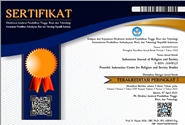Rekognisi dan Reposisi Aktor dalam Asimilasi Hukum Lama di Nagari (Baru) Sumatera Barat
Abstract
Nagari as a system of local wisdom that lives in the Minangkabau society has a long way in it relation to national law and international values, especially in the era of transnationalization of law. The regulations have been always led to a shifted the structure and function of the customary government structure in Minangkabau. This article is an evaluation of existing Nagari Government regulations in West Sumatra. The paradigm used is constructivist with a socio-legal approach. The result indicate that there is a shift in the order, structure, and function of cultural actors in society in the established local laws. The formation of local laws regarding Nagari as a response to the opportunities provided by the Village Law reaffirms the independence of the nagari through the existence of the Adat Salingka Nagari. The discussion to results leads to the use of the old legal assimilation in the legislation of Nagari Regulation has not succeeded to present a representative local law in protecting local wisdom in West Sumatra. So it is deemed necessary to minimize the state's domination of the people's needs in creating a balanced and comprehensive democracy.
Keywords
Full Text:
PDFReferences
Adli, H., & Mutalib, M. H. A. (2020). Tantangan Pemerintah Daerah dalam Penyusunan Peraturan Daerah Desa Adat : Upaya dalam Penetapan Desa Adat di Indragiri Hulu, Riau. Indonesian Journal of Religion and Society, 2(1), 45–58. https://doi.org/10.36256/ijrs.v2i1.80
Amaliatulwalidain. (2018). Representation of Political Role of Bundo Kanduang in The Regional Government System in Strengthening Local Democracy in West Sumatera. Journal of Malay Islamic Study, 2(2), 133–146.
Ammelia, E., & Kosandi, M. (2020). Politik Kartel di Tingkat Lokal: Studi Pemilihan Wakil Gubernur Kepulauan Riau Periode Sisa 2016-2021. Indonesian Journal of Religion and Society, 1(2), 138–150. https://doi.org/10.36256/ijrs.v1i2.72
An-Na’im, A. A. (1992). Toward a Cross-Cultural Approach to Defining International Standards of Human Rights: The Meaning of Cruel, Inhuman, or Degrading Treatment of Punishment. In A. A. An-Na’im (Ed.), Human Rights in Cross-Cultural Perspectives: A Quest for Consensus (hal. 19–43). Philadelphia: University of Pennsylvania Press.
Arikunto, S. (2014). Pengantar. In Tabrani & R. Murzikin (Ed.), Dasar-Dasar Metodologi Penelitian Kualitatif (hal. ix–xi). Yogyakarta: Darussalam Publishing.
Azwar, W., Yunus, Y., Muliono, M., & Permatasari, Y. (2018). Nagari Minangkabau: The Study of Indigenous Institutions in West Sumatra, Indonesia. Jurnal Bina Praja, 10(2), 231–239. https://doi.org/10.21787/jbp.10.2018.231-239
Benda-Beckmann, F., & Benda-Beckmann, K. von. (2009). Transnationalisation of Law, Globalisation and Legal Pluralism: A Legal Anthropological Perspective. In S. Irianto (Ed.), Hukum yang Bergerak: Tinjauan Antropologi Hukum (hal. 1–28). Jakarta: Yayasan Obor Indonesia.
Benda-Beckmannn, F., & Benda-Beckmann, K. von. (2007). Ambivalent Identities: Decentralization and Minangkabau Political Communities. In H. S. Nordholt & G. van Klinken (Ed.), Renegotiating Boundaries: Local Politics in Post-Soeharto Indonesia (hal. 417–442). Leiden: KILTV Press.
Benda-Beckmannn, F., & Benda-Beckmann, K. von. (2011). Changing One is Changing All: Dynamics in the Adat-Islam-State Triangle. In S. Irianto & Shidarta (Ed.), Metode Penelitian Hukum: Konstelasi dan Refleksi (2 ed., hal. 215–245). Jakarta: Yayasan Obor Indonesia.
Benda-Beckmannn, F., & Benda-Beckmannn, K. von. (2006). Changing One is Changing All: Dynamics in the Adat-Islam-State Triangle. Journal of Legal Pluralism and Unofficial Law, 38(53–54), 239–270. https://doi.org/10.1080/07329113.2006.10756604
Biezeveld, R. (2007). The Many Roles of Adat in West Sumatera. In J. S. Davidson (Ed.), The Revival of Tradition in Indonesian Politics (Routledge, hal. 203–223). https://doi.org/10.4324/9780203965498
Bowen, J. R. (2003). Islam, Law, and Equality in Indonesia: An Anthropology of Public Reasoning. Cambridge: Cambridge University Press.
Costantino, T. E. (2008). Constructivism. In L. M. Given (Ed.), The Sage Encyclopedia of Qualitative Research Methods (Volume 1-2) (hal. 116–120). London: Sage.
Creswell, J. W. (1998). Qualitative Inquiry and Research Design: Choosing Among Five Traditions. California: Sagu Publication Inc.
Firdaus, F. (2018). The Effort to Splitting Nagari Post-Implementation of Village Law 2014 in West Sumatra, Indonesia.
Fowler, M. W. (2010). Deepening Democracy: Explaining Variations in the Levels of Democracy. Naval Postgraduate School.
Hadler, J. (2010). Sengketa Tiada Putus: Matriarkat, Reformisme Islam, dan Kolonialisme di Minangkabau (S. Berlian, Ed.). Jakarta: Freedom Institute.
Hanani, S., & Aziz, R. A. (2009). Rekonstruksi dan Usaha Penyelamatan Tradisi Lokal Era Pasca Sentralisme di Indonesia. Geografia - Malaysian Journal of Society and Space, 5(2), 68–81. Diambil dari http://ejournal.ukm.my/gmjss/article/view/17905
Hidayat, D. N. (2003). Paradigma dan Metodologi Penelitian Sosial Empirik. Jakarta: Departemen Ilmu Komunikasi FISIK Universitas Indonesia.
Hoekema, A. (2017). The Conundrum of Cross-Cultural Understanding in The Practice of Law. Journal of Legal Pluralism and Unofficial Law, 49(1), 67–84. https://doi.org/10.1080/07329113.2017.1310446
Holzhacker, R. L., Wittek, R., & Woltjer, J. (2015). Decentralization and Governance for Sustainable Society in Indonesia. In Decentralization and Governance in Indonesia. https://doi.org/10.1007/978-3-319-22434-3_1
Holzinger, K., Haer, R., Bayer, A., Behr, D. M., & Neupert-Wentz, C. (2019). The Constitutionalization of Indigenous Group Rights, Traditional Political Institutions, and Customary Law. Comparative Political Studies, 52(12), 1–35. https://doi.org/10.1177/0010414018774347
Irianto, S. (2011). Memperkenalkan Studi Sosiolegal dan Implikasi Metodologisnya. In S. Irianto & Shidarta (Ed.), Metode Penelitian Hukum: Konstelasi dan Refleksi (2 ed., hal. 173–190). Jakarta: Yayasan Obor Indonesia.
Lichbach, M. I. (2009). Thinking and Working in the Midst of Things: Discovery, Explanation, and Evidence in Comparative Politics. In M. I. Lichbach & A. S. Zuckerman (Ed.), Comparative Politics: Rationality, Culture, and Structure (hal. 19–70). Cambridge: Cambridge University Press.
Lukito, R. (1998). Islamic Law and Adat Encounter: The Experience of Indonesia. Jakarta: INIS.
Lukito, R. (1999). Hukum dan Politik Pasca-Kemerdekaan Indonesia: Studi Kasus Agama dan Hukum Adat. Studia Islamika: Jurnal Kajian Islam Indonesia, 6(3).
Lukito, R. (2003). Law and Politics in Post-Independence Indonesia: a Case Study of Religious and Adat Courts. In A. Salim & A. Azra (Ed.), Shari’a and Politics in Modern Indonesia. Singapore: ISEAS Publishing.
Lukito, R. (2008). Hukum Sakral dan Hukum Sekuler: Studi Tentang Konflik dan Resolusi dalam Sistem Hukum Indonesiae. Jakarta: Alvabet.
Lukito, R. (2013). Legal Pluralism in Indonesia: Bridging the Unbridgable (Routledge Contemporary Southeast Asia Series Volume 48). London: Taylor & Francis.
Lukito, R. (2017). Mapping the Relationship of Competing Legal Traditions in the Era of Transnationalism in Indonesia. In G. F. Bell (Ed.), Pluralism, Transnationalism, and Culture in Asian Law: A Book in Honour of M.B. Hooker (hal. 90–116). Singapore: ISEAS Yusof Ishak Institute.
Lukito, R. (2019). Shariah and the Politics of Pluralism in Indonesia: Understanding State’s Rational Approach To Adat and Islamic Law. Petita: Jurnal Kajian Ilmu Hukum Dan Syariah, 4(1), 14–30. https://doi.org/10.22373/petita.v4i1.8
Mangkuto, H. A. D. R. (1999). Pemerintahan Nagari dan Kepemilikan Tanah Menurut Adat Minangkabau.
McCarthy, J. F. (2004). Changing to Gray: Decentralization and the Emergence of Volatile Socio-legal Configurations in Central Kalimantan, Indonesia. World Development, 32(7), 1199–1223. https://doi.org/10.1016/j.worlddev.2004.02.002
McWilliam, A. (2006). Historical Reflections on Customary Land Rights in Indonesia. Asia Pacific Journal of Anthropology, 7(1), 45–64. https://doi.org/10.1080/14442210600551859
Muslih, M. (2004). Filsafat Ilmu: Kajian Atas Asumsi Dasar Paradigma dan Kerangka Teori Ilmu Pengetahuan. Yogyakarta: Belukar.
Nan Putiah, H. J. D. M. (2004). Matrilinial dalam Adat Minangkabau. In L. D. Bandaro (Ed.), Minangkabau yang Gelisah: Mencari Strategi Sosialisasi, Pewarisan, Adat, dan Budaya Minangkabau untuk Generasi Muda. Bandung: Lubuk Agung.
Nurdin, I. (2017). Adat Revival and Local Capacity in Indonesia: The Case of Nagari. Sosiohumaniora, 19(2), 106–113.
Rahmat, A. (2013). Rekonstruksi Sistem Pemerintahan Nagari Era Otonomi Daerah: Kajian Terhadap Peraturan Daerah Sumatera Barat Nomor 9 Tahun 2001 jo. Nomor 2 Tahun 2007 tentang Ketentuan Pokok Pemerintahan Nagari. ID.
Rahmat, A. (2015). Reaktualisasi Nilai Islam dalam Budaya Minangkabau Melalui Kebijakan Desentralisasi. El-Harakah, 7(2). https://doi.org/10.18860/el.v0i0.2018
Rahmat, A. (2017a). Foreign Walinagari: The Unfinished (Political) Contemplation of Minangkabau’s Democracy. In A. Rahmat (Ed.), Biennial Conference on Sharia and Social Studies (Vol. 1, hal. 69–76). Padang: Fakultas Syari’ah UIN Imam Bonjol Padang.
Rahmat, A. (2017b). Nagari: Minangkabau in Decentralization Era. International Conference on Islam and Local Wisdom. Kendari: IAIN Kendari.
Rahmat, A. (2019). Civil Society Nagari Minangkabau: Restrukturisasi Adat dalam Lintasan Kebijakan. Bakaba: Jurnal Sejarah, Kebudayaan, dan Kependidikan, 8(1), 1–12. https://doi.org/https://doi.org/10.22202/bakaba.2019.v8i1.3453
Shalihin, N. (2003). Demokrasi Lokal di Bawah Bayang-Bayang Negara: Studi Atas Dominasi dan Hegemoni terhadap Nagari di Minangkabau. Universitas Gadjah Mada, Yogyakarta.
Shalihin, N. (2014). Demokrasi di Nagarinya Para Tuan (1 ed.). Padang: Imam Bonjol Press.
Strauss, A., & Corbin, J. M. (1990). Basic of Qualitative Research: Grounded Theory Procedures and Techniques. Thousand Oaks CA US: Sage Publication Inc.
Tobin, B. M. (2011). Why Customary Law Matters: The Role of Customary Law in the Protection of Indigenous Peoples’ Human Right (National University of Ireland Galway). Diambil dari http://hdl.handle.net/10379/2730
Tyson, A. D. (2010). Decentralization and Adat Revivalism in Indonesia: The Politics of Becoming Indigenous (D. McCargo, Ed.). New York: Routledge.
Utama, T. S. J. (2019). Impediments to Establishing Adat Villages: A Socio-Legal Examination of the Indonesian Village Law. Asia Pacific Journal of Anthropology, 21(1), 17–33. https://doi.org/10.1080/14442213.2019.1670240
van der Muur, W., Vel, J., Fisher, M. R., & Robinson, K. (2019). Changing Indigeneity Politics in Indonesia: From Revival to Projects. Asia Pacific Journal of Anthropology, 20(5), 379–396. https://doi.org/10.1080/14442213.2019.1669520
Vel, J. A. C., & Bedner, A. W. (2015). Decentralisation and Village Governance in Indonesia: The Return to The Nagari and The 2014 Village Law. Journal of Legal Pluralism and Unofficial Law, 47(3), 493–507. https://doi.org/10.1080/07329113.2015.1109379
Warman, K., Isra, S., & Tegnan, H. (2018). Enhancing Legal Pluralism: The Role of Adat and Islamic Laws Within The Indonesian Legal System. Journal of Legal, Ethical and Regulatory Issues, 21(3), 1–9.
Wignjosoebroto, S. (2002). Hukum: Paradigma, Metode, dan Masalah (1 ed.; I. Kasim, W. Yudho, S. Moniaga, N. Fauzi, R. Simarmata, & E. Sius, Ed.). Jakarta: ELSAM & HUMA.
Wignjosoebroto, S. (2011a). Penelitian Hukum dan Hakikatnya Sebagai Penelitian Ilmiah. In S. Irianto & Shidarta (Ed.), Metode Penelitian Hukum: Konstelasi dan Refleksi (2 ed., hal. 83–120). Jakarta: Yayasan Obor Indonesia.
Wignjosoebroto, S. (2011b). Ragam-Ragam Penelitian Hukum. In S. Irianto & Shidarta (Ed.), Metode Penelitian Hukum: Konstelasi dan Refleksi (2 ed., hal. 121–141). Jakarta: Yayasan Obor Indonesia.
Yunus, Y. (2001). Pemerintahan Nagari di Era Orde Baru: Persepsi Pemerintahan dan Masyarakat Terhadap Pemerintahan Nagari dalam Kaitannya dengan Otonomi Daerah. Universitas Brawijaya.
Yunus, Y. (2013). Aktor Kultural dalam Pemerintahan Terendah di Sumatera Barat: Posisi Ninik Mamak dalam Struktural Adat dan Penyelenggaraan Pemerintahan Formal. Humanus, XII(1), 21–32.
DOI: https://doi.org/10.36256/ijrs.v2i2.106
Refbacks
- There are currently no refbacks.
Copyright (c) 2020 Indonesian Journal of Religion and Society

This work is licensed under a Creative Commons Attribution-NonCommercial 4.0 International License.
Indonesian Journal of Religion and Society (IJRS) Is Indexed By:

Indonesian Journal of Religion and Society (IJRS) is distribute under Creative Commons Attribution-NonCommercial 4.0 International License.













